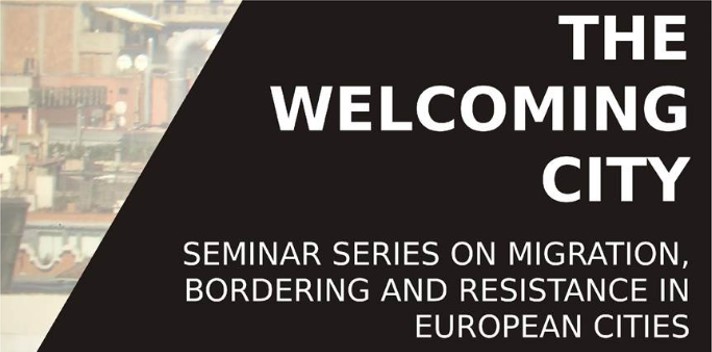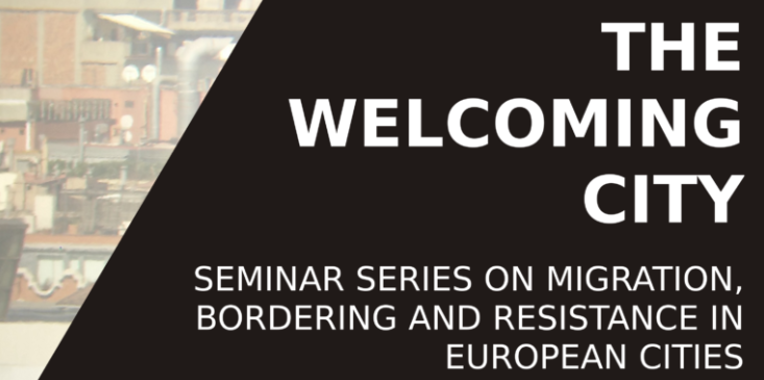
June 24, 2019 10:00 AM – 5:00 PM
ScrollBar, IT University of Copenhagen
TiP Members Vasilis Galis and Vasiliki Makrygianni are organizing and presenting at the Welcoming City Seminar:
This Urban Studies Foundation-sponsored seminar aims to understand (a) the role of cities as sites of migrant incorporation; (b) the interplay and contradictions between national and municipal agendas and the spaces that are carved out despite or because of these; and finally (c) the strategies and opportunities for resistance.
The most recent migration wave to Europe and the challenge of its incorporation has rightfully occupied a central part in recent urban studies scholarship: From local authorities and activists creating “sanctuary cities” (Bagelman 2016; Bauder 2016) to the crafting of national policies that lead to the “campization” of refugee accommodation in European cities (Kreichauf 2018), all the way to the urban apprenticeship of migrants themselves (Buhr 2018) migration has emerged as a “key urban challenge” (Brandt and Katz, 2017). Nevertheless, the immigration strategies of cities (Kühn 2018) are still dependent on national and international policies: The European Commission has set out the “inclusion of migrants and refugees” as a key Partnership in its Urban Agenda for the EU (EC, 2018). Finally, migrant subjects and their allies increasingly engage in new solidarities, essentially forming a new form peer-to-peer (P2P) welfare in order to protect and improve their living standards and infrastructures.
Many European cities have become sites of contestation and struggle over who belongs, how and for how long one is allowed to settle and take part in urban life and constitute the urban space. On the one side, everyday bordering practices increasingly hinder access to the city by curtailing and policing the right to housing, the labour market, legal representation and so on. On the other side, cities can, and often do, act as places of safety and refuge, belonging and membership, as well as resistance and new solidarities. This straightforwardly includes particular spatialities and materialities in the urban space such as migrant occupations and self-organized distribution networks. Less intuitively but equally important is the increasing use and proliferation of a variety of technologies, especially Information and Communications Technology (ICT), that allow for a P2P governance. Finally, even though nearly half of the world’s migrants are women, most policies and legal frameworks are not gender-responsive and are, therefore, responsible for creating new vulnerabilities for women. Therefore, a gendered approach to opportunities and experiences of urban integration and resistance is therefore imperative.
The following issues will be addressed:
• Access to housing and the labour market
• Legal rights and representation
• National vs local/municipal policies and agendas
• The role of technology in shaping migrant inclusion in the city
• Digital protests against exclusionary practices and for solidarity movements among and between urban populations
Organizers:
Anna Papoutsi, Birmingham/Loughborough University, a.papoutsi@lboro.ac.uk
Vasilis Galis, IT-University of Copenhagen vgal@itu.dk
Blanca Garcés-Mascareñas, CIDOB bgarces@cidob.org
Antonis Vradis, Loughborough University, a.vradis@lboro.ac.uk
Program
10.00 – 10.15 Arrival and introduction to the day
Morning session: Dwelling and refuge
How do migrants use urban dwelling to fight back against hostile national integration policies? What is the role of municipal authorities in facilitating or hindering the process? And what role can art play in mobilising the concept of sanctuary?
10.15 – 10.30 Introduction to morning session
10.30 – 11.00 Vasiliki Makrygianni, ITU
Migrant housing practices in the Athenian territory Commoning personal space against urban policies of exclusion and dispossession
11.00 – 11.30 Martin Bak Jørgensen, Aalborg University
Solidarity cities and cosmopolitanism from below: Barcelona as a refugee city
11.30 – 12.00 Jen Bagelman, University of Exeter
‘Sanctuary Artivism’: Exploring sanctuary solidarity through art
12.00 – 13.00 Questions and discussion
Afternoon session: Technologies and infrastructures
How do migrants use ICT to navigate the European Border Regime and their liminal lives as a whole? How may alternative solidarity infrastructures facilitate their struggle?
14.15 – 14.30 Introduction to afternoon session
14.30 – 15.00 Maria-Nerina Boursinou, University of Leicester
“I’m always here but I’m always somewhere else”: Information Communication Technologies and the liminal lives of the (forced) migrants in Greece
15.00 – 15.30 Fredi Mora, Linköping University
Crafting in squatted spaces: on alternative infrastructures of solidarity
15.30 – 16.00 Vasilis Galis & Martin Bak Jørgensen
Diginauts: Migrants’ digital practices in and of the European Border Regime
16.00 – 17.00 Questions and discussion
17.00 – 17.15 Closing remarks
Find more information here.
